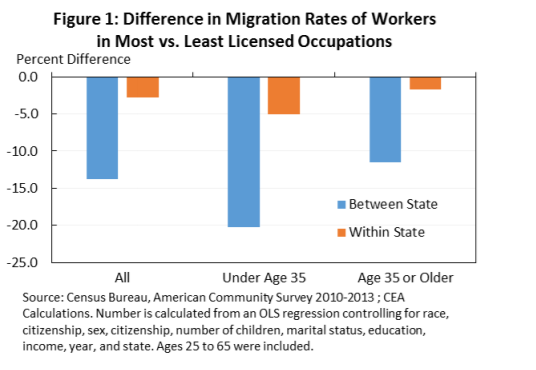Occupational Licensing Reduces Mobility
Brookings has a good memo on four ways occupational licensing reduces both income and geographic mobility. Here is point 1:
Since state licensing laws vary widely, a license earned in one state may not be honored in another. In South Carolina, only 12 percent of the workforce is licensed, versus 33 percent in Iowa. In Iowa, it takes 16 months of education to become a cosmetologist, but just half that long in New York. This licensing patchwork might explain why those working in licensed professions are much less likely to move, especially across state lines:
 The graph, is from the excellent White House report on occupational licensing. The first blue column says that workers in heavily licensed occupations are nearly 15% less likely to move between states than those in less licensed occupations–this is true even after controlling for a number of other variables that might differ across occupations and also influence mobility such as citizenship, sex, number of children, and education.
The graph, is from the excellent White House report on occupational licensing. The first blue column says that workers in heavily licensed occupations are nearly 15% less likely to move between states than those in less licensed occupations–this is true even after controlling for a number of other variables that might differ across occupations and also influence mobility such as citizenship, sex, number of children, and education.
The orange column provides another test. An occupational license makes it difficult to move across states but not within a state. If workers in licensed occupations had lower rates of mobility for some other reason than the license then we would expect that workers in heavily licensed occupations would also have lower rates of within state mobility. The orange bars show that workers in heavily licensed occupations do have slightly lower rates of within state mobility but not by nearly enough to explain the dramatically lower rates of between state mobility.
Lower rates of worker mobility mean that workers are misallocated across the states in a similar way that price controls or discrimination misallocate resources and reduce total wealth. Lower rates of workforce mobility also increase the persistence of unemployment.
To its credit, the Federal government is investing in efforts to make licenses more portable including encouraging “cross-State licensing reciprocity agreements to accept each other’s licenses.” Cross-state reciprocity agreements sound like an excellent idea.